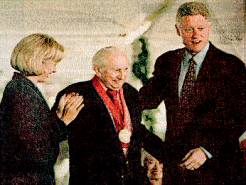|
Text 1
Why People Work
Attitudes Toward Working:
1.It is no use doing what you like; you have got to like
what you do.
— Winston Churchill, British prime minister
2. I do not like work—no man does—but I like
what is in the work—the chance to find yourself.
— Conrad Joseph, British novelist
3. One of the symptoms of approaching nervous breakdown is
the belief that one's work is terribly important, and that
to take a holiday would bring all kinds of disaster. If I
were a medical man, I should prescribe a holiday to any patient
who considered his work important.
— Bernard Russel, British philosopher
4. When work is a pleasure, life is joy! When work is duty,
life is slavery.
—Maxim Gorky, Russian writer
5. Work banishes those three great evils: boredom, vice, and
poverty.
— Voltaire, French philosopher
6. The more we do, the more we can do; the more busy we are,
the more leisure we have.
— William Hazlitt, British critic and essayist
7. Work is worth doing if worth doing well.
— Thomas Carlyle, British historian
8. Work is more than a necessary for most human beings; it
is the focus of their lives, the source of their identity
and creativity.
— Leonard R. Sayles, British writer
9. Why should work be such a significant source of human satisfaction?
A good share of the answer rests in the kind of pride that
is stimulated by the job, by the activity of accomplishing.
— Leonard R. Sayles, British writer
10. Work is the grand cure for all the maladies and miseries
that ever beset mankind.
— Thomas Carlyle, British historian
Language notes:
1. It's
not difficult to understand the tarnished reputation. Historically,
work has been associated with slavery and sin, compulsion
and punishment.
(因此工作受到贬低这一点就不难理解。历史上,工作一直同奴役、罪孽、强制和惩罚联系在一起。)
Tarnish: make or become less valuable
or respected.
e.g. His reputation was tarnished.
2. We've
watched programmers and engineers work fifteen and eighteen
hours at a stretch, seven days a week, when a job really got
tough and they knew that a crucial deadline had to be met,
or when a major project would fall unless some tough problems
were solved.
(我们还观察到,有时程序设计师和工程师会在工作中遇到很大困难,而工作必须如期完成,而有时一项大的工程面临着流产,除非他们能解决某个棘手的问题,这时他们就会连续工作15到18个小时,每周工作7天。)
At a stretch: in one continuous period.
e.g. I often had to work for over twenty hours at one stretch.
3. They
enjoyed "making it,"—winning despite difficult
odds; proving their capacities against the outsiders: nature,
a competitor, a complex problem; mastering something new every
day.
(他们喜欢“成功”的感觉——克服巨大的困难而胜利;证明自己应付外界(自然、竞争对手、或一个复杂的问题)的能力;每天都掌握新的东西。)
Make it: succeed in something, become successful.
e.g. He waited confidently for his band to make it.
4. And
this sense of belonging to an accomplished work group that
both outsiders and insiders recognize can handle itself with
extreme virtuosity is one of the distinctive satisfactions
of the world of work.
(一个成功的团体技术精湛,成绩卓著,得到了团体内外的认可。而归属于这样一个成功团体的感觉就构成了现实工作中的一种特殊的满足感。)
Virtuosity: high skill.
e.g. strive or virtuosity in performance on
piano.
5.
And the work group also gently
pressures its members to learn how to adjust to one another
so that the "rough edges" are worked off because
people know they must do certain things with and through one
another each day.
(而且团队也对每个成员有一些压力,使得他们学会相互适应,磨掉各自的“棱角”,因为他们知道自己每天都必须与他人协作并通过相互的努力来完成工作。)
Work something off: reduce or get rid of
something work or activity.
e.g. one of those gimmicks for working off
aggression.
Text 2
Working
About the Author:
Studs Terkel, broadcaster and author, has crossed the country
for over two decades interviewing the American people on such
topics as the Great Depression, World War II, and their jobs,
and creating books that reveal their intimate portraits. My
American Century (1997) is a collection of the most memorable
interviews from his eight classic works which include: Division
Street (1967), Hard Times (1970), Working (1974),
The Good
War (1984), which won the Pulitzer Prize for nonfiction,
The
Great Divide 1988), and RACE (1992).
Willie Morris( Tribune Books )claimed: "Terkel's books
have touched profoundly upon our lives."






Pulitzer Prize-winner Studs Terkel will be
eighty-six this year, placing him right in the middle of those
he interviewed for this book. His radio program on WFMT is
still broadcast each day in Chicago, and his oral histories—a genre he has largely created and defined—remain widely
read throughout the world. At present, he is beginning to
organize the nine thousand interviews that he has accumulated
over the years, planning a new series of broadcasts and books
based on this incomparable archives.
|

PHOTO
CREDIT: RON EDMONDS/AP
Pres.
& Mrs. Clinton escorts Studs Terkel after
presenting him with a 1997 National Humanities
Medal last September.
|
Language notes:
1. When
I got out of high school, I didn't want no secretary job.
(高中毕业时我不想当秘书。)
Text Two is written in natural English, the sentence "I didn't
want no secretary job" just means "I didn't want any secretary
job."
There are other similar expressions in the text, e.g. I don't
know no other work but this.
2. Sometimes
the boss asks me and I get a kick out of it.
(有时老板问我,这时候我总是很开心。)
Kick: a thrill of pleasure, often reckless excitement.
e.g. I get such a kick out of driving a racing car.
3.
When I get home I get my second wind.
(回到家后我会喘口气,恢复精力。)
Get my second wind: have a rest, restore
to the normal station.
e.g. He paused for wind.
4. That's
where my boss stepped in.
(这时我的老板过来解围。)
Step in: become involved in a
difficult or problematic situation, especially in order to help or prevent something from
happening.
e.g. The government stepped in to limit car imports from other
countries.
5. At
times, when I feel sick, I come to work feeling I'll pep up
here.
(有时候我感觉不舒服,来上班时我想也许在这儿我能好起来。)
Pep up: (an informal expression), add liveliness
or vigour to someone or something.
e.g. measure to pep up economy.
6. What
irritates me is when customers get very cocky with me.
(让我生气的是那些对我趾高气扬的人。)
Cocky: conceited or arrogant, especially in a
bold or cheeky way.
7. It's
fishy.
(这不可能。)
Fishy: (informal expression) arousing
doubt or suspicion.
e.g. I'm convinced there's something fishy going on.
TOP |
